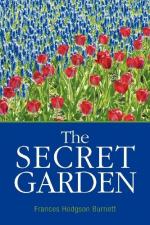He turned about to the orchard side of his garden and began to whistle—a low soft whistle. She could not understand how such a surly man could make such a coaxing sound.
Almost the next moment a wonderful thing happened. She heard a soft little rushing flight through the air—and it was the bird with the red breast flying to them, and he actually alighted on the big clod of earth quite near to the gardener’s foot.
“Here he is,” chuckled the old man, and then he spoke to the bird as if he were speaking to a child.
“Where has tha’ been, tha’ cheeky little beggar?” he said. “I’ve not seen thee before to-day. Has tha’ begun tha’ courtin’ this early in th’ season? Tha’rt too forrad.”
The bird put his tiny head on one side and looked up at him with his soft bright eye which was like a black dewdrop. He seemed quite familiar and not the least afraid. He hopped about and pecked the earth briskly, looking for seeds and insects. It actually gave Mary a queer feeling in her heart, because he was so pretty and cheerful and seemed so like a person. He had a tiny plump body and a delicate beak, and slender delicate legs.
“Will he always come when you call him?” she asked almost in a whisper.
“Aye, that he will. I’ve knowed him ever since he was a fledgling. He come out of th’ nest in th’ other garden an’ when first he flew over th’ wall he was too weak to fly back for a few days an’ we got friendly. When he went over th’ wall again th’ rest of th’ brood was gone an’ he was lonely an’ he come back to me.”
“What kind of a bird is he?” Mary asked.
“Doesn’t tha’ know? He’s a robin redbreast an’ they’re th’ friendliest, curiousest birds alive. They’re almost as friendly as dogs—if you know how to get on with ’em. Watch him peckin’ about there an’ lookin’ round at us now an’ again. He knows we’re talkin’ about him.”
It was the queerest thing in the world to see the old fellow. He looked at the plump little scarlet-waistcoated bird as if he were both proud and fond of him.
“He’s a conceited one,” he chuckled. “He likes to hear folk talk about him. An’ curious—bless me, there never was his like for curiosity an’ meddlin’. He’s always comin’ to see what I’m plantin’. He knows all th’ things Mester Craven never troubles hissel’ to find out. He’s th’ head gardener, he is.”
The robin hopped about busily pecking the soil and now and then stopped and looked at them a little. Mary thought his black dewdrop eyes gazed at her with great curiosity. It really seemed as if he were finding out all about her. The queer feeling in her heart increased.
“Where did the rest of the brood fly to?” she asked.
“There’s no knowin’. The old ones turn ’em out o’ their nest an’ make ‘em fly an’ they’re scattered before you know it. This one was a knowin’ one an’ he knew he was lonely.”
Mistress Mary went a step nearer to the robin and looked at him very hard.




